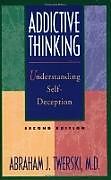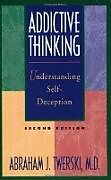Addictive Thinking
Einband:
Kartonierter Einband
EAN:
9781568381381
Untertitel:
Understanding Self-Deception
Genre:
Parapsychologie, Esoterik & Spiritualität
Autor:
Abraham J Twerski
Herausgeber:
HAZELDEN PUB
Auflage:
Revised
Anzahl Seiten:
156
Erscheinungsdatum:
01.04.1997
ISBN:
978-1-56838-138-1
Informationen zum Autor Dr. Abraham J. Twerski is founder and medical director emeritus of the Gateway Rehabilitation Center in Pittsburgh, Pennsylvania. A rabbi, psychiatrist, and chemical dependency counselor, he is the author of numerous journal articles and books, including Self-Discovery in Recovery, I Didn't Ask to Be in This Family: Sibling Relationships and How They Shape Adult Behavior and Dependencies, and, with "Peanuts" cartoonist Charles Schulz, When Do the Good Things Start? Klappentext A key to achieving a lasting recovery is understanding the thought processes and patterns of addiction. Here is a revised edition of a classic that deals with the complicated and contradictory thinking patterns of addiction, featuring expanded information on depression and affective disorders. Zusammenfassung The unpredictability and anxiety associated with the coronavirus pandemic can cloud and confuse everybody's thinking. Excuses, self-deception and addictive logic can harm your recovery and relationships. Don't let it. In addiction, a person with a substance use disorder undergoes a negative change in thinking and behavioral patterns. A person's character is overthrown by addictive thinking: displacement, projection, shame, and hypersensitivity are addiction's survival mechanisms. With Addictive Thinking , both addict s and loved ones familiarize themselves with these addictive signatures and more, and begin the fight for recovery. With more than 200,000 copies of Addictive Thinking sold worldwide, the eminent Abraham Twerski, M.D., outlines the destructive and terrifying illogic that marries a person with a substance use disorder to his addiction. Stinking thinking and irrational thought are byproducts of addiction and they only worsen with time. Twerski, with a deep psychological understanding, steps in to explain and contextualize all of the actions that arise from addictive thinking. It might be easier to point at abnormal behavior from an addict and simply think, there she goes again. But there is reason and consistency underneath the pandemonium. If nothing is learned, if nothing is done, an addict's rock bottom will continue to sink. By educating oneself about the addictive illogic and its reasoning, one will understand why the person behaves as she does and how everyone in her life becomes controlled by addiction. Then control can be taken back....
Klappentext
A key to achieving a lasting recovery is understanding the thought processes and patterns of addiction. Here is a revised edition of a classic that deals with the complicated and contradictory thinking patterns of addiction, featuring expanded information on depression and affective disorders.
Zusammenfassung
The unpredictability and anxiety associated with the coronavirus pandemic can cloud and confuse everybody's thinking. Excuses, self-deception and addictive logic can harm your recovery and relationships. Don't let it.
In addiction, a person with a substance use disorder undergoes a negative change in thinking and behavioral patterns. A person’s character is overthrown by addictive thinking: displacement, projection, shame, and hypersensitivity are addiction’s survival mechanisms. With Addictive Thinking, both addicts and loved ones familiarize themselves with these addictive signatures and more, and begin the fight for recovery.
With more than 200,000 copies of Addictive Thinking sold worldwide, the eminent Abraham Twerski, M.D., outlines the destructive and terrifying illogic that marries a person with a substance use disorder to his addiction. “Stinking thinking” and irrational thought are byproducts of addiction and they only worsen with time. Twerski, with a deep psychological understanding, steps in to explain and contextualize all of the actions that arise from addictive thinking.
It might be easier to point at abnormal behavior from an addict and simply think, “there she goes again.” But there is reason and consistency underneath the pandemonium. If nothing is learned, if nothing is done, an addict’s rock bottom will continue to sink. By educating oneself about the addictive illogic and its reasoning, one will understand why the person behaves as she does and how everyone in her life becomes controlled by addiction. Then control can be taken back.

Leider konnten wir für diesen Artikel keine Preise ermitteln ...
billigbuch.ch sucht jetzt für Sie die besten Angebote ...
Die aktuellen Verkaufspreise von 6 Onlineshops werden in Realtime abgefragt.
Sie können das gewünschte Produkt anschliessend direkt beim Anbieter Ihrer Wahl bestellen.
Loading...
Die aktuellen Verkaufspreise von 6 Onlineshops werden in Realtime abgefragt.
Sie können das gewünschte Produkt anschliessend direkt beim Anbieter Ihrer Wahl bestellen.
| # | Onlineshop | Preis CHF | Versand CHF | Total CHF | ||
|---|---|---|---|---|---|---|
| 1 | Seller | 0.00 | 0.00 | 0.00 |
